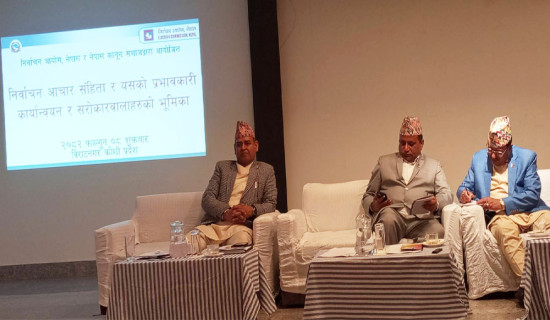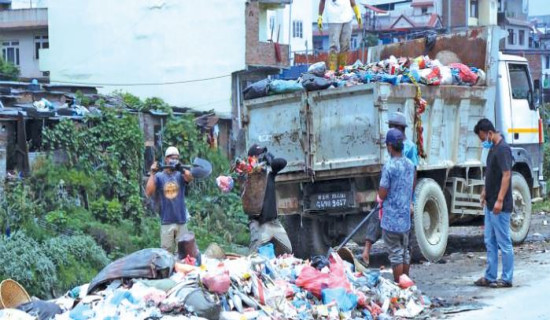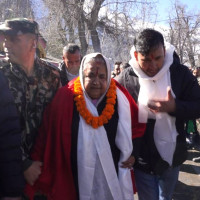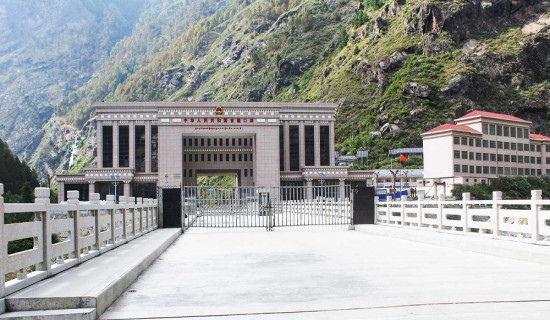- Saturday, 21 February 2026
Message Of Bhandari's Trip To China
The recent visit of former president Bidya Bhandari to China grabbed the headlines last week, with analysts offering their multiple interpretations of it. The former president has already created ripples by engaging herself in various political activities at home. By visiting China, she seeks to enhance her image as a credible figure poised to stage a comeback in national politics. She was accorded a high regard in China, where she held talks with top Chinese leaders, including Vice President Han Zheng and Liu Jianchao, head of the International Department of the Communist Party of China.
Bhandari led a team comprising a minister and a bunch of UML functionaries. At the moment, she does not represent the government nor the UML. Still, she maintained a communication channel with the higher echelon of Chinese leadership. On the foreign policy front, China recognises and deals with a legitimate power. Its diplomacy is not laden with a baggage of ideology. It fosters relations with all the governments of all hues – the right, the centre and the left. This has been evident since the post-Mao era marked by opening up and reforms.
Fraternal ties
The Chinese Communist Party (CPC) has fraternal ties mainly with left parties, though it has a policy of interacting with all sorts of parties that are either ruling or those that influence national policy, national politics and economic course. In giving priority to Bhandari, there is both ideology and geopolitics. There is a strong perception that with the abolition of the monarchy in Nepal, China has lost a reliable force here. China is not happy when important agreements signed in the past, as well as projects under the Belt and Road Initiative (BRI), have not been implemented despite the commitments from successive governments.
Various media reports, citing a UML leader who accompanied Bhandari on a China trip, have claimed that the CPC attached importance to Bhandari as a future leader of UML, and conveyed a message that she should move ahead to unify the left forces in Nepal. However, Chinese leaders and officials do not directly dictate to any visiting foreign leaders to do this or that. So, the claims of the UML leader should be taken with caution. China has been inviting her to address the significant international events, whether she was in the presidency or not.
CPC has established a fraternal bond with the UML and other left parties for decades. So it is natural for it to have a strong communist force that would lead the government and ensure stability in the Himalayan nation. China considers political stability an important factor in implementing various understandings and accords between the two nations. However, geopolitics has crept into domestic politics, so political stability alone does not determine the countries’ ties with their neighbours. For any foreign nations, it has become necessary to take major domestic players into confidence before inking and executing the bilateral deals that may or may not smack of vested interests.
China’s dilemma arising from the sluggish progress in the implementation of BRI and other agreements is understandable. In Nepal, certain conditions should be fulfilled in the timely execution of BRI projects. Firstly, major parties should agree on their implementation. This constitutes a plausible basis that does not give rise to controversy surrounding the BRI projects. For this, China should forge a better understanding with non-communist parties such as the Nepali Congress (NC), Rastriya Prajatantra Party and Rastriya Swatantra Party to this end. The NC is still swayed by the myth of debt trap diplomacy, a narrative constructed by the Western and Indian media, politicians and academics. The Chinese government should convince the major political stakeholders that the financial modality of BRI in no way strangles Nepal with high-interest-rate loans.
Potential
Second, a majority government solely involving the communist parties can guarantee the speedy progress on the BRI. A strong communist government might shrug off the internal and external obstacles that come in the way of the implementation of BRI. Third, the relationship between China and India should be improved. India still thinks of Nepal as its sphere of influence and is against the idea of implementing the BRI. Nepal’s trade and economy rely on India and it finds it difficult to deal with pressure and sometimes threats from the southern neighbour against the BRI. The NC, the largest party in the parliament, does not want to irk India and the West by agreeing on the BRI framework. The BRI holds the potential to unlock economic potential in Nepal if its projects are implemented with soft loans or grants.
Can Bhandari emerge as a trustworthy figure on whom China counts like late kings Mahendra and Birendra? Perhaps not. Her rise to such a stature is fraught with big challenges. She is still not an acceptable leader within the UML itself. The current UML establishment does not want her to take on the mantle of the party leadership. The number of her supporters is indeed growing in the party. Until she becomes an influential leader of a strong party, she is unlikely to shape national politics and foreign policy. She faces ethical questions when she re-enters politics after becoming the head of state two times. There is also a pitfall for China. By 'encouraging' Bhandari to initiate communist unity, it risks alienating non-communist forces that are already looking askance at its global connectivity project and increased engagement with Nepali communists.
(The author is Deputy Executive Editor of this daily.)




-square-thumb.jpg)



-square-thumb.jpg)








